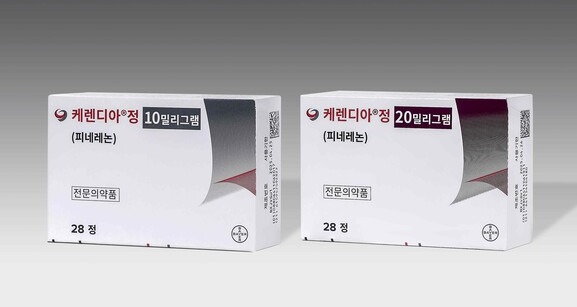Bayer Korea's treatment for chronic kidney disease with type 2 diabetes, Kerendia (finerenone), will be covered by health insurance for adult patients starting next month.
Kerendia is a first-in-class non-steroidal selective antagonist of the mineralocorticoid receptor, a novel mechanism of action that inhibits kidney inflammation and fibrosis in adult patients with chronic kidney disease accompanied by type 2 diabetes.
According to the Ministry of Health and Welfare’s public notice, Kerendia is indicated for adult patients with chronic kidney disease accompanied by type 2 diabetes, who, despite administering angiotensin-converting enzyme (ACE) inhibitor or angiotensin II receptor blocker at the maximum tolerated dose for at least four weeks, show uACR > 300 mg/g or urine dipstick test positive (1+ or greater) and estimated glomerular filtration rate (eGFR) 25≤eGFR<75 mL/min/1. In this case, health insurance coverage is available for combination therapy with standard therapy (ACE inhibitors or angiotensin II receptor blockers) for those with an area of 73 m2.
It excludes patients with chronic heart failure (NYHA class II to IV) with persistent symptoms and should be discontinued if eGFR decreases to less than 15 mL/min/1.73 m2.

In the FIDELIO-DKD study, which confirmed inhibition of kidney function impairment, cardiovascular benefits, and safety, Kerendia demonstrated inhibition of chronic kidney disease progression by significantly reducing the primary composite endpoint of end-stage renal disease, a sustained decline in eGFR of at least 40 percent from baseline for at least four weeks, and renal cause death by about 18 percent compared to placebo.
Death due to cardiovascular cause, nonfatal myocardial infarction, and the risk of hospitalization due to nonfatal stroke or heart failure, which constitutes a major secondary endpoint, was significantly reduced by about 14 percent compared to placebo, confirming the risk reduction benefit for cardiovascular events.
The FIGARO-DKD study, which included patients with stage 1-2 chronic kidney disease, also showed a significant effect on the primary cardiovascular composite endpoint compared to placebo.
"Until now, only treatments targeting hemodynamic changes and metabolic abnormalities have been available for the three causes of worsening chronic kidney disease in type 2 diabetes. However, with the advent of Kerendia, it is now possible to treat kidney inflammation and fibrosis," said Dr. Kim Jong-hwa, chief of the Department of Endocrinology at Bucheon Sejong Hospital.
With the lack of treatment options for chronic kidney disease, Kerendia is significant because of its novel mechanism of action to inhibit inflammation and fibrosis in the kidneys, which existing therapies have not addressed. Now that it is available for clinical use through health insurance coverage, it is expected to revolutionize the treatment of chronic kidney disease with type 2 diabetes, Dr. Kim added.
Noh Myung-kyu, head of the Cardiovascular Therapeutics Business Division at Bayer Korea, said, "With the incidence of diabetes-induced end-stage renal disease in Korea increasing at one of the fastest annualized rates in the world over the past decade and becoming a growing social burden, the reimbursed launch of Kerendia will provide patients with type 2 diabetes with a new treatment option to delay the progression of chronic kidney disease."
In May 2022, Kerendia won approval from the Ministry of Food and Drug Safety for treating adult patients with chronic kidney disease accompanied by type 2 diabetes to reduce the risk of sustained decline in eGFR, progression to end-stage renal disease, death from cardiovascular causes, and hospitalization for nonfatal myocardial infarction and heart failure.
Related articles
- Bayer's chronic kidney disease drug Kerendia passes drug review panel
- [ESC 2022] 'Earlier initiation of finerenone maximizes protective effects in T2D and CKD patients’
- Bayer’s Kerendia to compete against SGLT-2 inhibitors
- Bayer Korea, Chong Kun Dang to co-market kidney disease treatment Kerendia
- Bayer's Kerendia marks a paradigm shift in diabetic kidney disease treatment with reimbursement
- Bayer Korea charts new course under 1st Korean leader Lee Jin-a

